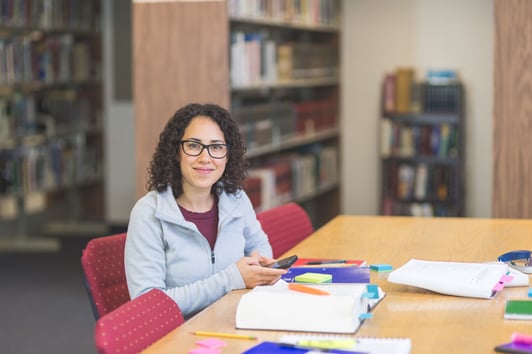What Makes a Special Education Teacher Effective?
10 Characteristics That Matter Most
A special education teacher who works with autistic students needs to have an array of interpersonal skills, ranging from competency and consistency to adaptability and discernment. Throughout the school year, special educators must wear a variety of hats and be able to pivot quickly and effortlessly when challenges arise. As academic lessons are carried out, instructors must also independently motivate students, stay focused on their overarching goals for classroom success, and consider the unique strengths and weaknesses of each learner to help them succeed.
Below are 10 characteristics of an effective special education teacher:
1. Collaborative
A collaborative special education teacher is service-oriented and dedicated to the work done as a member of the learner’s academic team. Such instructors collaborate closely, consistently, and effectively with other specialists (including speech-language pathologists, occupational therapists, and early intervention providers) when developing individualized education plans (IEPs) for each student.
Direct communication and active participation are essential aspects of collaboration for all team members working with autistic students. As such, special educators must maintain close partnerships with each professional on their students’ educational teams. By remaining open-minded and collaborative, special education instructors can proactively plan for the attainment of each learner’s academic goals while remaining dedicated to student progress and advocating for an enriching academic environment focused solely on meeting the needs, interests, and goals of each student.

2. Research-Based
Secondly, an effective special education teacher supports instructional strategies based on best practices in the current scientific literature. Research-based educators implement approaches that are consistent with evidence-based protocols and classroom management techniques to foster a unified community of success among learners.
Instructors should advocate for instructional programs that are backed by relevant academic studies, such as Comprehensive Treatment Models (CTMs). Examples of CMTs that autistic students may benefit from in the classroom setting include the LEAP approach, SCERTS model, Pivotal Response Treatment (PRT), and/or TEACCH strategies--which are scientifically validated practices for managing classroom behavior and presenting instructional lessons to autistic learners.1 A recent resource issued by the Autism Evidence & Practice Clearinghouse has a complete list of evidence-based practices for autistic children, youth, and young adults.
3. Innovative
Developing an innovative approach for managing classroom behavior while enhancing student achievement within the classroom environment is another key characteristic of effective special education teachers. By tracking, graphing, and analyzing each student’s progress over time, educators can implement individualized interventions to cultivate continued progress toward the goals of each learner. One tool that may be particularly helpful for tracking long-term academic gains is the Standard Celeration Chart, which presents the progress of each student in a consistent, individualized, and graphical format.2 Using the best tools and supports for each student is important and at the same time, it can also be effective to adapt materials and try innovative approaches based on the personal needs of the student with whom you are working.
4. Even-tempered
As autistic learners tend to present with behavior challenges, remaining calm, composed, and even-tempered is a fourth characteristic of an effective special education teacher. When handling difficult situations, those in charge must remain firm, focused, and consistent. Educators who maintain a personal repertoire of classroom management strategies will be better equipped to address challenging student behaviors and refrain from becoming overly permissive. It is important to not take things personally when a student is exhibiting challenging behaviors.
5. Competent
Competent special education instructors excel in their efforts to assist students with learning differences by applying their professional knowledge in the context of classroom instruction. Remaining reasonable, competent, and dependable when handling everyday situations provides autistic learners with much-needed stability. Competence requires educators to stay up to date on current research, methods, trends, and evidence-based practices for classroom lesson plans. Promoting a positive and consistent learning environment helps students who thrive in structured settings achieve personal success.
In short, competent instructors are assertive and recognize that autistic students may need additional time to process verbal directions.3 With this in mind, special education teachers should provide extra time and support (e.g., visual instructions, prompts, and/or guidance) as needed to help students process verbal information more fluently and efficiently.

6. Perceptive
Special educators must be in tune with the needs of each learner so that they can individualize classroom lesson plans and remain organized, attentive, and diligent. Research has found that autistic students tend to be over- or under-responsive to sensory input, and not all autistic children experience sensory input in the same way.3
As a result, special education instructors should be perceptive of the varying needs of each student in their classroom on a daily basis. Some learners may be sensory seekers, requiring rich sensory input, while others actively avoid sensory input and become easily overstimulated by bright lights, loud noises, and certain textures.
7. Consistent
Consistency is essential for many students with learning differences. Therefore, it is important to ensure that educational environments for autistic students are carefully coordinated across all academic settings.
Giving clear instructions and setting concrete classroom rules is one way that special educators can provide consistency. For example, creating a set daily schedule may help learners transition more smoothly from one activity to the next. Efforts should also be made to stick with established routines and only make changes when absolutely necessary.
8. Adaptable
The importance of remaining adaptable and optimistic when working with learners in a special education environment cannot be overstated. Students may not progress at a consistent pace, so educators should remain flexible, competent, open-minded, and willing to implement new teaching strategies as needed.
Adaptability remains an essential component for student and teacher success. Educators must develop multiple ways to present classroom instruction and adjust their teaching styles according to the unique needs of each student. Since autistic learners tend to be literal thinkers, giving clear, straightforward, and structured directions will help students develop a keen understanding of what is expected of them. Additionally, setting consistent rules and reasonable expectations will benefit students who are concrete learners.4

9. Accepting
Special education teachers should be accepting of--and attentive to--the diverse needs of the students they serve. Having an awareness of the triggers for problem behavior among autistic learners enables educators to accept the challenges their students face and devise new ways to assist their learners in managing difficult situations.
Effective instructors are accepting of their students’ differences while seeking to adapt to unforeseen circumstances as they arise. Keeping calm, composed, and even-tempered allows educators to objectively observe, remain present throughout the school day, and keep the best interests of each student in mind as they carry out daily lesson plans. Modeling and teaching acceptance of every student and their diverse needs can foster an inclusive environment where all students can thrive.
10. Student-focused
Finally, it is crucial for special educators to remain student-focused with a compassionate regard for each learner’s academic abilities. An instructor who thrives in this area will be able to empathize with students while remaining confident and firm in their role as a teacher, leader, and classroom role model.
Many autistic students struggle to initiate, engage in, and maintain relationships with peers in social environments. For this reason, a student-focused instructor must meet each learner where that student is at and assist in developing the skills necessary for success in community settings. By objectively monitoring student progress throughout the year, educators can provide learners with an opportunity to visualize their own academic and social gains using tools and resources for continued success.
Are there other traits for special education teachers that you think are important besides the ones I have included here?
References:
- https://www.oneontacsd.org/Downloads/research-based-practices-for-teaching-students- with-disabiliti.pdf
- Vargas, J. S. (2013). Behavior analysis for effective teaching (2nd ed.). New York, NY: Routledge, Taylor & Francis Group.
- Hall, L. J. (2018). Autism spectrum disorders: From theory to practice (3rd ed.). New York, NY: Pearson.

Kenna McEvoy
Kenna has a background working with children on the autism spectrum and enjoys supporting, encouraging, and motivating others to reach their full potential. She holds a bachelor's degree with graduate-level coursework in applied behavior analysis and autism spectrum disorders. During her experience as a direct therapist for children on the autism spectrum, she developed a passion for advocating for the health and well-being of those she serves in the areas of behavior change, parenting, education, and medical/mental health.




